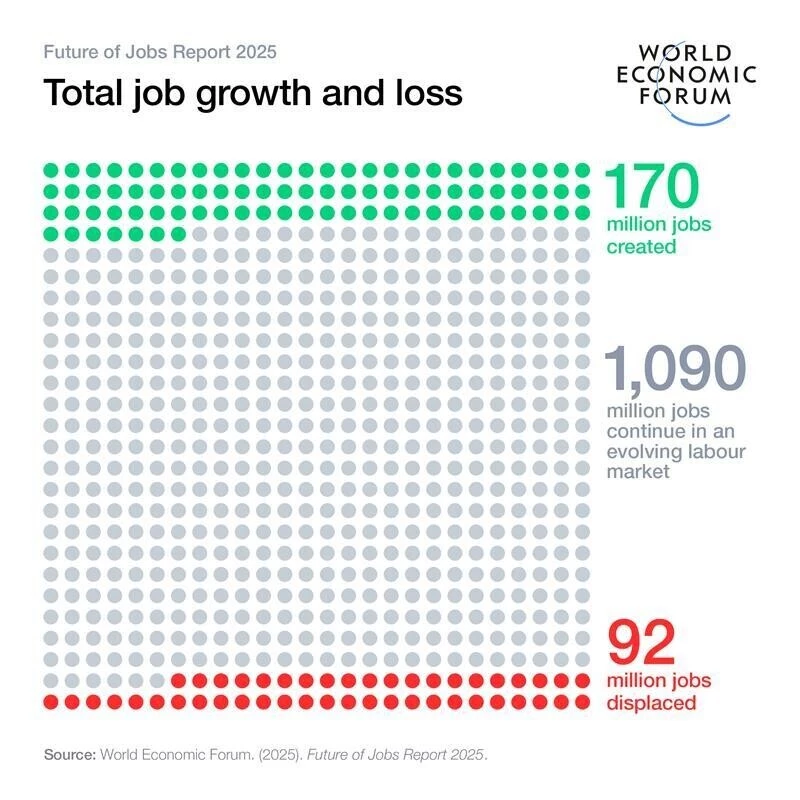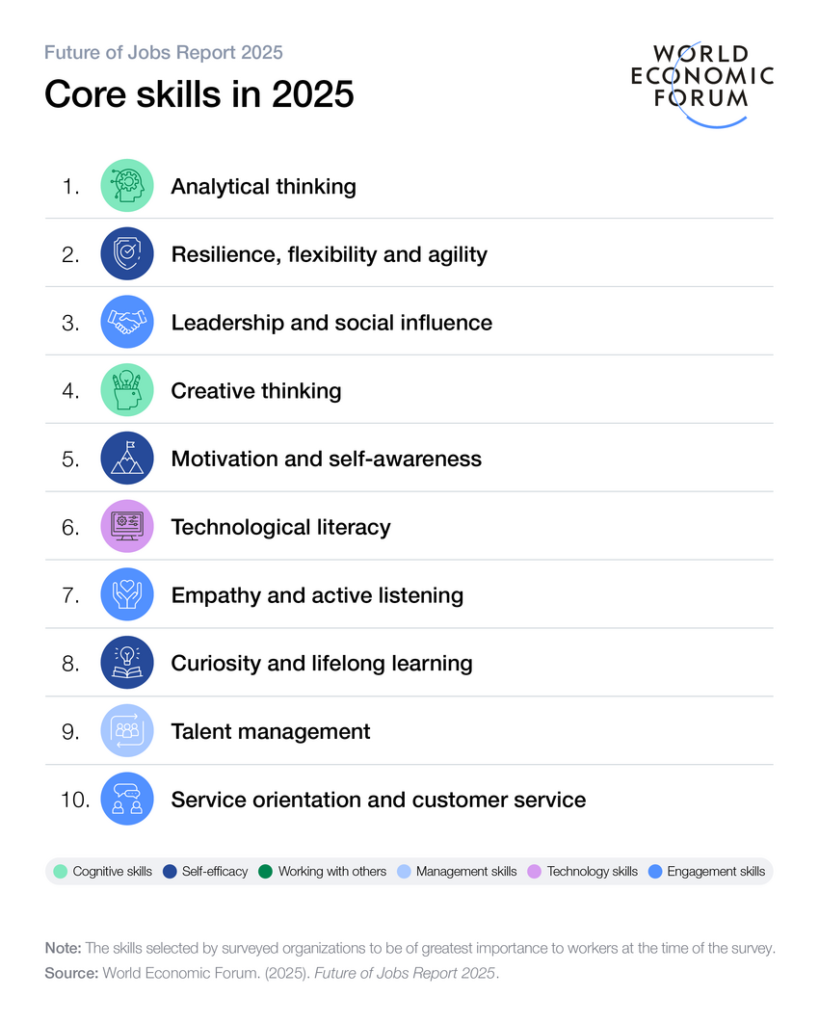How to Guide Your Child Through the Evolving Global Labour Market
The world of work is undergoing seismic shifts, driven by rapid technological advancements, shifting economic priorities, and emerging industries. For parents, this presents a unique challenge, and opportunity, in guiding children to make informed educational and career decisions.
The World Economic Forum’s Future of Jobs Report 2025 highlights the trends shaping the global labour market and provides valuable insights for parents striving to prepare their children for a competitive and fulfilling future.
In the context of evolving educational needs and workforce demands, parents need to take a proactive role in helping their children navigate this complex terrain. Here's what you need to know and how you can help your child adapt and thrive.
The Changing Nature of Work: Key Trends
The global labour market is being shaped by trends such as automation, artificial intelligence (AI), and climate change. According to the Future of Jobs report, between 2025 and 2030, approximately 92 million jobs are expected to be displaced due to technological advancements, while about 170 million new roles are anticipated to emerge. This results in a net gain of 78 million jobs globally.

The fastest-growing professions are projected to be in technology-related fields, including Big Data Specialists, Fintech Engineers, and AI and Machine Learning Specialists. Conversely, roles such as clerical and secretarial workers, including cashiers and ticket clerks, are expected to see the largest declines.
This transformation means that parents can no longer rely on traditional ideas of job stability or career pathways. Rather than focusing solely on specific professions, it’s crucial to guide children toward developing adaptable skills and lifelong learning habits that will prepare them to embrace a rapidly changing job landscape.
Skills That Will Define the Future Workforce
To help children succeed in the global labour market, parents should emphasise the development of future-proof skills. According to the Future of Jobs report, the most in-demand skills by 2025 include:
- Analytical Thinking and Innovation
These skills underpin roles such as data scientists, engineers, and strategists. Encourage your child to cultivate curiosity and problem-solving abilities through STEM activities and subjects. - Technology Use and Monitoring
As emerging technologies become integral to business operations, proficiency in digital tools and platforms is essential. Coding, cybersecurity, and digital literacy are foundational skills for the next generation. - Resilience and Flexibility
The uncertainty of the job market highlights the importance of adaptability. Guide your child to embrace challenges and view setbacks as opportunities for growth. - Emotional Intelligence
With automation focusing on tasks, uniquely human traits like empathy, communication, and teamwork are becoming invaluable. These traits prepare children for roles in human resources, counselling, and leadership positions. - Lifelong Learning
Knowledge has a shorter shelf life in a fast-changing world. Instilling a growth mindset and encouraging children to pursue continuous education will keep them competitive.

Educational Pathways for the Fourth Industrial Revolution
The Future of Jobs report underscores the need for a blend of technical and soft skills to prepare for the Fourth Industrial Revolution. For parents in Asia and globally, the question becomes: What types of education should your child pursue?
1. A Broader Approach to Education
While traditional academic pathways remain important, they are no longer sufficient. Parents should consider schools and universities that integrate interdisciplinary learning, such as blending STEM with the humanities. For instance, schools offering the International Baccalaureate (IB) curriculum often emphasize creativity, collaboration, and critical thinking, which align with future workforce needs.
2. Vocational and Alternative Pathways
For children with specific aptitudes or interests, vocational programmes in robotics, renewable energy, or healthcare technology offer direct entry into high-growth fields. Apprenticeships and short-term certifications can also be valuable, particularly in industries like AI or software development.
3. Online Learning Platforms
The rise of online education provides parents and their children with unprecedented access to high-quality resources. Platforms like Coursera, edX, and Khan Academy allow learners to explore fields like data science, programming, and business management from home, often for free or at low cost.
The Role of Parents in Career Exploration
Helping children navigate their career options requires a balanced approach. Here's how you can take an active role in preparing your child for the global labour market:
1. Encourage Exploration
Expose your child to diverse career paths early on. Shadowing professionals, attending industry events, or enrolling in summer programmes can help your child discover their interests.
2. Support Skill Development
Invest in extracurricular activities that nurture both hard and soft skills. Robotics clubs, debate teams, or creative writing workshops can complement academic learning and broaden your child’s skill set.
3. Cultivate Financial Awareness
In an unpredictable job market, financial literacy is more important than ever. Teach your child about budgeting, saving, and the costs associated with higher education or career changes.
4. Emphasize Global Competence
Many future jobs will require employees to collaborate across cultures and time zones. Consider international schooling options or encourage language learning to prepare your child for a globalised workforce.
5. Promote Resilience
Teach your child that failure is part of growth. Resilience, grit, and the ability to adapt to change are vital in a world where career pivots are becoming the norm.
Implications for Parents in Asia
In Asia, where many economies are rapidly industrialising, the shift toward technology-driven jobs is especially pronounced. Countries like Singapore, South Korea, and Japan are already at the forefront of adopting AI and green technologies. Parents in these regions should guide their children to consider high-demand fields such as software development, clean energy, and healthcare.
Singapore, in particular, has aligned its education system to future workforce demands. Initiatives such as SkillsFuture encourage lifelong learning, while secondary school programmes focus on applied learning and technology integration. As parents, leveraging these resources can give your child a head start in a competitive labour market.
A Vision for the Future
The global labour market is in a state of flux, but with the right guidance, children can thrive in this dynamic environment. By fostering adaptability, supporting skill development, and encouraging lifelong learning, parents can help their children prepare for meaningful careers.
In an ever-evolving world, education choices must go beyond the classroom. They should empower children to think critically, collaborate effectively, and innovate boldly. As parents, your role is to help them navigate this journey and equip them with the tools they need to succeed.
Let us know in the comments: How are you preparing your child for the future workforce?
Our aim is to help our children discover their talents, realise their full potential, and develop a passion for life-long learning.





